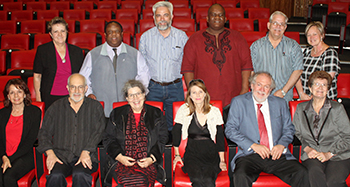Latest News Archive
Please select Category, Year, and then Month to display items
![]()
#UFSupdate (18 March 2020): UFS IMPLEMENTS MEASURES TO MINIMISE RISK OF COVID-19 TO STAFF
STATEMENT BY PROF FRANCIS PETERSEN, RECTOR AND VICE-CHANCELLOR
The executive management of the University of the Free State (UFS) welcomes the announcement of Dr Blade Nzimande, Minister of Higher Education, Science and Technology on 17 March 2020 that all post-school training institutions will have an early recess, starting on 18 March 2020. The Minister’s directive that universities should minimise risk of COVID-19 to all its staff during this time is also welcomed.
The announcement of Dr Nzimande is in line with the university’s decision on 16 March 2020 to suspend the academic programme as from 17 March 2020 and to resume it again on 14 April 2020.
It is important for us all to know that this is not business as usual, and that different thinking is required. Responsible citizenship is one of the crucial elements the world has increasingly been experiencing for the past few weeks. This is why we must act out our responsibility towards one another by focusing on ways in which social distancing can be achieved – especially during this low-risk period that South Africa is still experiencing. This is one of the reasons that informed the university’s decision on 16 March 2020 week to suspend the academic programme and also for students to vacate the residences by 20 March 2020.
The health and well-being of our staff members are equally important. The university’s Employee Task Team that was established on 16 March 2020 analysed options for the continuation of university operations during the recess period. These options were submitted to the executive management, discussed with the Chairperson of the UFS Council and approved on 18 March 2020.
Staff members who have children at school and pre-school may work from home on 19 and 20 March 2020. For the period 23 March 2020 to 13 April 2020, the number of staff members present on all three campuses will be reduced to a minimum and staff members may be allowed to work from home where practically possible.
Arrangements have been made to accommodate those staff members who are performing services which cannot be done from home (such as cleaning, gardening, maintenance, sports, etc) in a flexible and reasonable way. Similar arrangements will be made with office-based support services staff, prioritising institutional needs and based on humane and personal circumstances. Academic staff have been requested to ensure that the online learning materials are finalised and made available for the online learning platform.
The decision for employees to work from home is based on the premise that all employees are deemed to be at work from 23 March 2020 to 13 April 2020. This requires staff members to be available and contactable by line managers at all times during the university’s normal working hours.
I am comfortable that these measures will alleviate the concerns from our staff regarding the spreading of COVID-19 and the risk to themselves without compromising university operations.
Prof F W Petersen
Rector and Vice-Chancellor
University of the Free State
Special Edition of the Journal for New Generation Sciences launched at UFS
2016-10-26

Participants of the round-table discussion
at the launch of the Journal for New Generation
Sciences during the UFS Faculty of Education
colloquium which took place on 20 October 2016.
Photo: Oteng Mpete
The Journal for New Generation Sciences Special Edition was launched on 20 October 2016, at the Albert Wessels Auditorium, during the University of the Free State’s (UFS) Faculty of Education colloquium on the field of technological higher education and its contribution to the knowledge society.
Partnerships and knowledge production
Prof Laetus Lategan, Dean of Research and Innovation at the Central University of Technology (CUT), led the launch. “Higher education is not only about producing knowledge but it is also about fostering new relationships,” said Prof Lategan referring to CUT’s collaboration with the UFS Faculty of Education.
“Empowering people is important for capacity building, offering novice writers the opportunity to learn and a way to enhance their academic writing,” said Prof Lategan.
The Journal for New Generation Sciences is an accredited research publication in which scholars, internal and external to the institution, may publish. It accommodates national and international publications and showcases the university’s commitment to applied research.
Growing in leaps and bounds
According to Dr Somarie Holtzhausen, from the Faculty of Education’s School of Higher Education Studies, all papers are peer-reviewed by at least two experts. An editorial review also secures the quality of the paper. In 2014, when the journal was established, 30 contributions were submitted, although only 25 were successfully published.
“We turn down content not because it is not good, but unfortunately because it does not speak to the heart of the journal,” said Prof Lategan. With 60 peer reviewers, the journal’s contributors are assured that at least two peer reviewers will assess their article.
The Journal for New Generation Sciences supports both high-quality scholarly work of established researchers, and capacity building among new researchers.
During the round-table discussion various contributors to the journal spoke about their research and involvement in the publication of the journal.